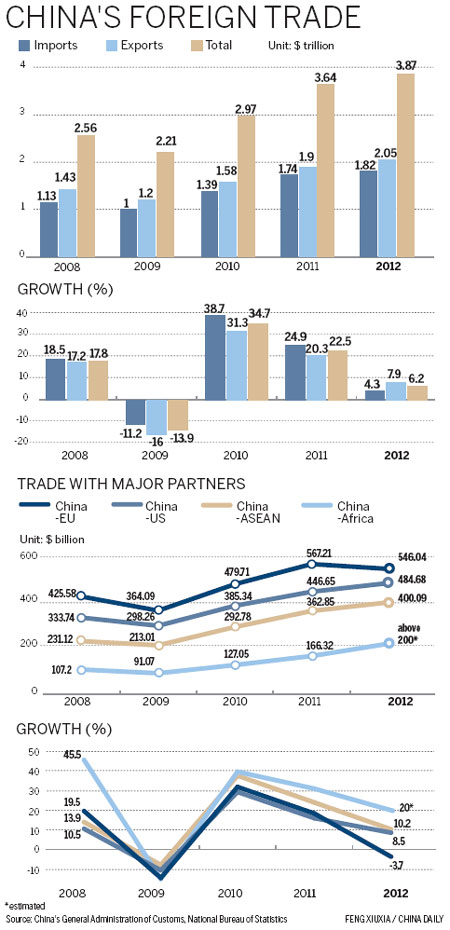Trade in the balance
Updated: 2013-02-01 09:12
By Yan Yiqi (China Daily)
|
|||||||||||
Challenges remain
Apart from the shrinking demand from developed markets, the biggest challenge for Chinese exporters are the trade barriers being set up by other countries.
According to statistics from the Ministry of Commerce, 72 investigation cases were issued against Chinese products in 2012, a 38 percent year-on-year growth.
Li Jian of the Chinese Academy of International Trade and Economic Cooperation says the situation will be even worse this year, with an increasing number of emerging markets joining the campaign.
"The emerging markets want to get the same 'benefits' that the developed markets got by establishing trade barriers for Chinese products. The problem is especially difficult in traditional manufacturing industries because these are the industries they intend to develop domestically," he says.
Jin Shanfu, secretary-general of Zhejiang Yiwu Socks Association, says that many of the association member companies are worried over the trade barriers being created by developing countries.
|
||||
Meanwhile, developed markets have also shifted their emphasis from China's traditional manufacturing industries to advanced ones, where they can set up more technical barriers.
Zhou Zhenyang, general manager of Vollodis Furniture (China) Co in Shunde, says that trade barriers are the biggest obstacle for the company to expand in overseas markets.
"Developed markets like the EU and the US have very strict environmental protection rules and standards, which forces us to adjust our sales structures. It will take a long time for companies like ours to adjust the products to meet these standards," he says.
According to Li, emerging industries like photovoltaic and telecommunications will bear the brunt of the trade barriers erected by Western countries.
"The EU and US markets have taken trade protectionism to the political level, making it hard for us to counter it," he says.
However, Ross holds the idea that no matter how fierce the trade protectionism can be, which is not at the point, Chinese exporters have their weapons to fight back.
"There is not a great deal that can be done solely by China's individual export industries which are hit by protectionism - although of course lobbying, legal challenges and other methods should be used. China's strongest bargaining position is that it is the world's second largest importer, with an extremely rapid growth of imports. Therefore other countries are extremely anxious to keep access to China's markets open for themselves," he says.
Yang Yang and Bao Chang contributed to this story.
yanyiqi@chinadaily.com.cn

(China Daily 02/01/2013 page1)
Related Stories
Feeling the pinch 2013-02-01 09:12
Time to play the import card 2013-02-01 09:12
It's what comes in that matters 2013-02-01 09:12
Success lies beyond borders 2013-02-01 09:12
Today's Top News
List of approved GM food clarified
ID checks for express deliveries in Guangdong
Govt to expand elderly care
University asks freshmen to sign suicide disclaimer
Tibet gears up for new climbing season
Media asked to promote Sino-Indian ties
Shots fired at Washington Navy Yard
Minimum growth rate set at 7%
Hot Topics
Lunar probe , China growth forecasts, Emission rules get tougher, China seen through 'colored lens', International board,
Editor's Picks

|

|

|

|

|

|









